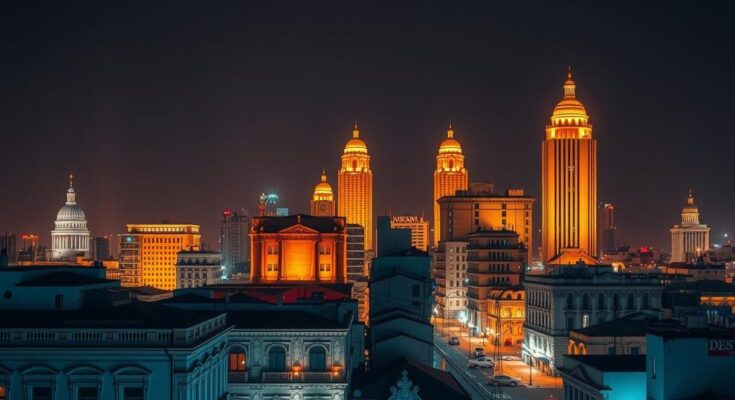Cuba has restored power to much of Havana after a nationwide blackout that affected 10 million people. Power was reinstated following the reconnection of the national grid and the resumption of major oil-fired power plants. However, many residents continue to experience reduced electricity supply. Schools in western provinces will remain closed until Tuesday due to ongoing difficulties.
Cuba has successfully reconnected its national electrical grid, restoring power to much of Havana by late Sunday, officials reported. The restoration followed a widespread outage affecting 10 million people, which began after a transmission line shorted at a Havana substation, leading to a total blackout across the island.
As of late Sunday, Havana’s electric company announced that about two-thirds of its clients had their power restored, and this number was anticipated to increase overnight. The return of electricity was met with cheers from residents after two days of darkness.
The outage resulted in significant disruptions for a city of two million, halting commerce, closing most restaurants, and turning off street and traffic lights. The restoration of power was aided by the return of the two largest oil-fired power plants, Felton and Antonio Guiteras, to operation by late Sunday.
Officials indicated that electricity had also reached Pinar del Río province, the last region to regain power, just before dark. This incident marked the fourth nationwide blackout in Cuba since October, compounding the struggles of a grid already strained by obsolete technology and dwindling oil imports from Venezuela, Russia, and Mexico.
Prior to the collapse, many Cubans were experiencing blackouts lasting over 20 hours daily. Despite the partial restoration of power on Sunday, officials noted that they were only generating one-third of the usual daily demand, leaving many residents without electricity.
In response to the crisis, schools in western provinces such as Pinar del Río, Artemisa, and Mayabeque will remain closed until Tuesday to ensure safe conditions for students. The Cuban government attributes the energy crisis to a longstanding U.S. trade embargo and recent sanctions imposed by former President Donald Trump, while also pushing forward with plans for solar farms in collaboration with China to reduce reliance on outdated oil-fired generation.
Cuba’s recent reconnection of its electrical grid represents a crucial step towards regaining stability after a significant blackout affecting millions. While power restoration has progressed, challenges remain as the country struggles to meet energy demands and grapples with an enduring energy crisis attributed to both outdated infrastructure and external sanctions. The government is actively seeking sustainable energy solutions to mitigate future outages.
Original Source: gazette.com




